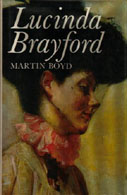 | Lucinda Brayford Martin Boyd 1946 |
I have to admit from the outset I'm struggling with this book. It didn't help that at the time I was due to start it - a month or so back - I was deep in the throes of preparing, and then travelling, to the US and back. I kept finding excuses to read something else, the D.M. Cornish novel was just so damn good, and I was more than a bit knackered by the whole travel experience. But I did start the book a while back, and if starting was hard enough, then continuing to plough my way through its 546 pages is going to be a real trial.
Take the first part of the novel as an example: in the first chapter we are introduced to William Vane in Clare College, Cambridge, in the middle of the nineteenth century. He and some mates are getting a skinful in his rooms when someone decides it would be a great idea to drag Audrey Chapman, an undergraduate aiming to take Holy Orders, out of his rooms below Vane's and to toss him into the river. The upshot of all this is Chapman's near-death from pneumonia, Vane having to pay for his medical expenses which nearly bankrupts him, Vane being caught cheating at cards in an attempt to obtain some money to pay his bills, and Vane being sent down. His father doesn't want to know about him so he is packed off to Australia to make his fortune. Chapman's illness doesn't improve so he is also sent out to Victoria. Both men marry and have children. One son and one daughter from each family meet up and finally marry. Immediately after the marriage Vane decides to return to England, but falls overboard on the voyage and is lost at sea. Some thirty years has elapsed from first scene to last, and we have only moved on six (6!!) pages. The first character we meet on page one is now dead and this isn't a murder mystery. And we're still a generation away from the eponymous character, Lucinda, being born.
Needless to say, the prose is rather declamatory. Trying to squeeze all that into such a short space leaves little room for any style. It's purely scene-setting for later in the novel, and it's real hard going. A lot of writing courses will tell you that knowing when to start a novel will get you a fair way towards engaging the reader in a story they want to read. Boyd, and this novel, would have been better served in scrapping the first chapter entirely. At least Lucinda is born at the end of the second chapter. Which is its saving grace.
Notes:
Martin Boyd Wikipedia page
The next four works:
18. A Fortunate Life by A.B. Facey (1981)
19. Picnic at Hanging Rock by Joan Lindsay (1967)
20. "Five Bells" by Kenneth Slessor (1939)
21. Capricornia by Xavier Herbert (1938)
